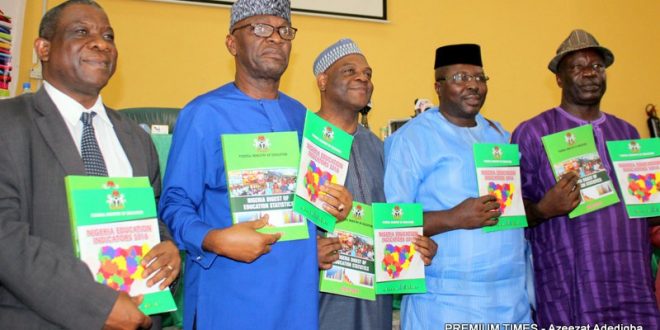The Nigerian government says it has taken steps at collating timely statistics for effective planning and policy making in the educational sector.
This was disclosed by the Minister of State for Education, Anthony Anwukah, at the launch of Nigeria Digest of Education statistics 2014-2016 and Nigeria Education Indicators for 2016 in Abuja.
He said the government had made funds available to the Nigeria Education Management Information System, NEMIS, in order to ”meet up with the 21st century global best data reporting practices.”
Similarly, the permanent secretary at the Federal Ministry of Education, Sonny Echono, said timely, accurate, credible and reliable data is important in the society especially the education sector.
“We live in a global information society where the flow of data and information is constantly evolving. Big data and analysis is one of the growth centres of the new knowledge – driven economy,” he said.
According to him, how the nation ”gathers, strives, processes, analyses and utilises data constitutes the most significant index in determining Nigeria global standing and completeness.”
“It is not surprising that states like Sokoto, Kano, Katsina, Jigawa, Anambra and Lagos, which have privatised and adopted a culture of planning are taking the lead in addressing such challenges as out-of-school children and the overall quality of education in their respective states,” he said.
He said lack of accurate data has impacted negatively on the nation’s planning process and the image of the country internationally.
Similarly the Minister of the FCT, Muhammed Bello, who was represented by Theresa Mbono, said accurate data makes service delivery in the city more efficient and properly managed.
“FCT has conducted 2015/2016 secondary school annual census so data is when proper and systematic planning are built,” he argued.
Meanwhile, the representative of International Development Partners, IDP, Olatunde Adekola, said the mission to generate adequate data demonstrated that the Nigerian government is committed to openness and accountability.
He also explained the need for a viable database in the education sector.
“Credible data is crucial to attaining sustainable development and Nigerians will be able to ask questions on issues arising in the education sector. But publications like this need collaboration across the globe which includes state and non-state actors,” he said.
In her reaction, Matthew Nganijiozor from NEMIS, said one of the major challenges faced in collating data in the education sector is that students do not avail themselves of census in schools especially those in military, paramilitary and private schools.
 National Telescope national telescope newspaper
National Telescope national telescope newspaper



